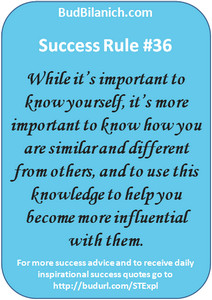 Interpersonally competent people understand themselves. They use this self understanding to better understand others and build and maintain, long term, mutually beneficial relationships with the important people in their lives. You have to understand yourself if you want to understand others and build strong relationships. Take a few minutes and answer these questions.
Interpersonally competent people understand themselves. They use this self understanding to better understand others and build and maintain, long term, mutually beneficial relationships with the important people in their lives. You have to understand yourself if you want to understand others and build strong relationships. Take a few minutes and answer these questions.
When I need to recharge my batteries, do I like to prefer to be around other people, or do I prefer to be by myself?
Do I like to take in information in a structured step by step manner, or do I prefer getting a lot of information all at once and figuring out the connections for myself?
Do I make decisions with my heart or with my head?
Do I like to resolve things quickly, or do I like to wait to the last minute to commit to a course of action?
You probably lean to one or the other of the choices in the four questions above. Once you know your answers to these questions, think about the people around you. How are they similar to you? How are they different?
Let’s take a Friday night for example. You and your partner or spouse are invited to a party. You’ve both had a long, tough week and you’re both tired. If you are the type of person who recharges your batteries by engaging in solitary activities, make sure you find time for yourself. If you spouse or partner is the opposite, let him or her go to the party on his or own. He or she won’t even miss you – there will be enough people at the party to recharge his or her batteries, and you’ll get the precious alone time that you need.
If you take in information in a highly structured step by step manner, you will have a difficult time dealing with people who are big picture thinkers and make intuitive leaps. You like to have information presented in a 1, 2, 2a, 2b, 3, 3a, 3b, 3c manner. On the other hand big picture people, those who make intuitive leaps will be all over the place 1, 4a, 3b, 2, 2d. You will be frustrated with them because of what you’ll perceive as a lack of structure and discipline. They are likely to be frustrated with you because of what they perceive as a lack of imagination on your part. Both of you need to adapt your communication style to best be able to communicate with one another.
If you make decisions with your heart, you will have a difficult time convincing someone who makes decisions with his or head to do something because “it is the right thing to do”. Instead, you’ll need to figure out the rational, logical reasons for what you want to do if you are going to convince a “head” person to go along with your ideas.
If you like to resolve things quickly, you will be frustrated by someone who waits till the last minute to commit. If you want to build a strong relationship with this type of person, you’ll need to help this type of person understand the urgency in committing to a course of action. On the other hand, you might find it beneficial to take a step back and see if you are creating artificial deadlines merely to satisfy your own needs.
While it’s important to know yourself, it’s more important to know how you are similar and different from others, and to use this knowledge to help you become more influential with them. The more you can understand your style and needs, the better you will be able to understand others’ style and needs. The more you can adapt your preferred style to another person, the better able you will be to build relationships and resolve conflict.

Speak Your Mind